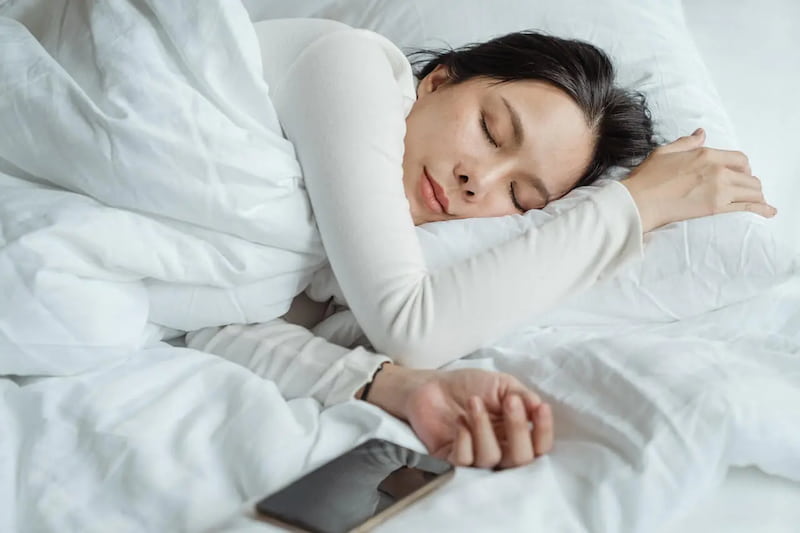Can Meditation Replace Sleep? Here’s What You Need To Know
Both sleep and meditation have potent restorative properties that not only allow the body and mind to rest but also revitalize and reenergize every aspect of ourselves. However, while meditation is optional, sleep is a necessary component of life. So the question still stands: can meditation replace sleep?
Meditation has been shown to be associated with a decrease in total sleep time, particularly in long-term meditators – so yes, it can partially replace sleep. In general, this relationship is direct; you can substitute 30 minutes of meditation for 30 minutes of sleep. However…
However, there is a catch: this relationship is only valid up to a certain point. In order to function properly, humans need a certain minimum amount of sleep, which cannot be fully substituted. Let’s explore this relationship a little more deeply in order to comprehend why by first examining a common misunderstanding.
Continue reading for more details.
Table of Contents
What Is Meditation?
I know it seems silly to ask, but meditation is more than what many people believe; it is not simply sitting still. It is a skill that must first be honed through experience.
Achieving a more acute state of awareness and focus through meditation is a way to develop the mental and emotional abilities necessary for concentration and clarity. Instead of thinking nothing at all, this technique involves letting your thoughts wander before bringing them back to your breathing. It soothes you and clears the clutter from your mind.
Why Some People Believe That Meditation Can Replace Sleep
What, then, about meditation causes people to believe that it can lessen the need for sleep? Well, it boils down to one of the main purposes for which we require sleep—to unwind and reenergize our minds.
When we meditate, certain hormones are released from our brain – these include
- Serotonin – the chemical that helps to regulate our mood
- GABA – which helps us to keep calm
- Melatonin – the ‘sleep hormone’ which helps us get restful sleep
As you can see, these substances all work to mitigate some of the negative effects of sleep deprivation. Even those with sleep issues are given melatonin prescriptions, so by meditating, we are putting a natural sleep aid in our brains.
It also gives our brain a break; by slowing down and concentrating on our breathing, we are assisting our brain in relaxing, much like when we sleep.
Differences And Similarities Between Meditation And Sleep
We frequently wonder if we are sleeping while we are meditating, despite the fact that we never question whether we are doing so when we are asleep. That’s because meditation and sleep share some characteristics. Here are a few similarities and differences between sleeping and meditating.
Even though there are many obvious differences between sleep and meditation, it is understandable why we might mistakenly believe that we can replace sleep with meditation given that both promote relaxation and lower heart and breathing rates. However, we cannot switch out sleep for meditation because the body requires Delta waves, which are only produced during deep sleep. However, we can increase the amount of sleep we get by adding a meditation routine, which might eventually result in less sleep being required. You will, at the very least, feel more alert and mentally sharper, and your sleep will be better. With a regular meditation practice, you can also get rid of a lot of sleep problems, like insomnia, because meditation greatly reduces stress.
10 Minutes Of Meditation Is Equal To 4 Hours Of Sleep: Is It True?
False. The fact is, human beings generally need a minimum of about 4-6 hours sleep, after which the amount of meditation done can be equivalent to the remaining amount of sleep needed to reach the 7-8 hours required for optimal functioning. It also depends on how long a person has practiced meditation.
As a result, 10 minutes of meditation are roughly equivalent to 10 minutes of sleep and can even take its place of it. Up to about two to three hours of meditation, this relationship remains largely linear. After this, even if they meditate more (with the exception of long-term skilled meditators), the average person starts to have trouble functioning normally during the day when they get less than 5 to 6 hours of sleep.
Studies in this field have examined the effects of replacing a portion of sleep with meditation and testing participants’ ability to perform well on psychomotor vigilance tasks (PVT). They discovered that those who meditated saw an improvement in their PVT scores, and that those who meditated while getting less sleep didn’t noticeably suffer from lower PVT scores. They also discovered that long-term meditators who practiced for at least a few hours every day could function well on 5 to 6 hours of sleep.
The general consensus is that, in order to function optimally without building up sleep debt, humans require a basic core amount of sleep of about 7-8 hours (for adults). It is possible to safely substitute thirty minutes of meditation for the thirty minutes of sleep required by this minimum, doing so without significantly degrading performance and occasionally even enhancing it. If you can manage to practice meditation for 1-2 hours each day, the average person can function at their best on 6 hours of sleep. Only regular practitioners of meditation can afford to lower this bar.
How Many Minutes Of Meditation Are Equal To One Hour Of Sleep?
I hear you. Can I replace every now and then 20 minutes of meditation with 30 to 60 minutes of sleep? The College of Business at Oregon State University discovered that 44 minutes of sleep could be replaced by 10 minutes of meditation. However, this doesn’t seem to mean that you should forgo a full night of sleep in favor of 110 minutes of meditation. Do you recall those Delta waves? You will need to receive those Delta waves in greater quantities unless you are a true master of meditation.
Perhaps adding meditation on a regular basis would be preferable to trying to replace sleep with meditation. Maintain your regular sleeping schedule and check to see if you eventually require a little less sleep. Many meditators do!
But make sure to schedule an extra 10 to 20 minutes of meditation if you occasionally have trouble falling asleep. Nobody wants to go through their day feeling like a zombie!
What Kind Of Meditation Can Replace Sleep Temporarily?
There isn’t a specific meditation technique that can be used to replace several hours of lost sleep, as you may have wondered. To fully benefit from sleep, you must sleep every night for the recommended number of hours.
It is acceptable to get up 20 to 30 minutes earlier than usual (thereby shortening your sleep) in order to meditate. Setting your goals for the day in the morning can be facilitated by meditation, which will also make you feel more alert and improve your mental clarity.

Types Of Deep Sleep Meditation For A Good Night’s Rest
You can improve your sleep quality and get the necessary rest before a new day by meditating before going to bed.
Here are some techniques that you can use:
Breathing Exercises
It involves paying attention to and controlling your breaths, then eventually slowing them down to tell your mind that it is time to go to sleep. Breathing exercises are a type of meditation for sleep. Here is how to do it:
- Take a deep breath, savor the sensation of your body expanding as you do so while lying comfortably in bed.
- Exhale completely, concentrating on how your body feels as you do so.
- After a few repetitions, slow down as you exhale, making sure that each exhalation takes twice as long as the inhalation.
Body Scanning
Not only can this technique aid in better sleep, but it can also lessen stress and anxiety, increase self-awareness and self-compassion, lessen pain (especially for those who experience chronic pain), and lessen cravings for nicotine (for those trying to quit smoking).
Here is how to meditate to sleep using the body scan method:
- Your limbs should be free to fall and stretch as you lie down comfortably.
- Focus on your breathing as you close your eyes. As you breathe in and out, pay attention to how your body feels like it is expanding and contracting.
- Select a starting point. The top of your head or your legs are both acceptable starting points. The majority of people choose to move up from the bottom.
- You should begin by feeling your toes. Turn them off and move to your foot after you have examined them.
- Start with both legs and work your way up until you reach your head.
Visualization
In order to relax your mind and make it easier for you to fall asleep, bedtime visualizations call for you to swap out your tense, fearful thoughts for peaceful, calming ones.
- Put yourself in a setting from your past where you experienced the most tranquility and relaxation. This could be done while strolling through a large field of flowers, relaxing by the sea while watching the waves crash on the sand, lying outside while listening to the crickets chirp, etc.
- Once your mind has arrived, take in as many sensory details as you can. When is it in the day? Are you warm and cozy or chilly and cold? What noises can you hear? Are the waves crashing if you’re near water? What color is the sky? How bright are the stars if you’re looking at them? Do you have a sense of the grass beneath your feet? Is there a campfire nearby?
It will make it easier for you to drift off to sleep if you spend a few minutes picturing this serene setting before bed or while you are already in bed.
Practicing Gratitude
Being appreciative of what we have is something we should practice. It is a contentedness that results from appreciating everything we have. Spend a moment putting love and kindness into action in every area of your life. You’ll feel happier and sleep better as a result of this.
Counting
Your mind will begin to relax and become more open to sleep if you start counting down from any selected number.
Practice Yoga
You can unwind from the day and relax by using some yoga poses and concentrating on your breathing while doing them. Child’s Pose, Standing Forward Bend, and Corpse Pose are a few yoga asanas that can aid in nighttime meditation for sleep.
How Meditation Can Help You Reduce Your Need For Sleep
Your need for sleep is probably out of whack if your work/life balance is off. Too much fatigue and stress can result from not getting enough good sleep or from sleeping more than your schedule allows. By incorporating meditation into your daily schedule, you will give your body and mind time to recover from stress and exhaustion before your head even touches the pillow. That is, if you execute it properly.
Because it can give you more energy, morning meditation is a great way to start your day. Therefore, it’s probably best to refrain from meditating right before bed unless you’re using a body scan meditation or another guided sleep meditation.
Other forms of meditation, such as those based on mantras or the breath, will probably leave you feeling more energised afterward. In order to avoid being overly energized at bedtime, be sure to practice these techniques earlier in the day rather than later.
Ancient yogis and modern yogis who practice uninterrupted daily meditation for longer periods of time enter deeper sleep states and can function on less sleep. And from the very first session, people who practice SKY Breath Meditation get deeper, better sleep.

Is Meditation A Good Alternative To Sleep?
No, you shouldn’t because 1 in 3 adults don’t get enough sleep, according to the Centers for Disease Control and Prevention. Lack of sleep is caused by factors such as:
- Breathing repeatedly stops and starts during sleep, a condition known as sleep apnea.
- Your diet: Heartburn-risky spicy foods and too much caffeine will keep you awake. Your ability to sleep well will be hampered by drinking alcohol before bed.
- Lack of physical activity
- Mental issues – Such as depression, stress, and anxiety
- An uncontrollable urge to move your legs is a symptom of restless leg syndrome. When you’re sitting or lying down, it frequently occurs in the evening or at night.
- Bad Sleep habits
The Sleep Foundation advises young adults (18 to 25 years old) and adults (26 to 64 years old) to try to get 7 to 9 hours of sleep every night, while those (over 64 years old) should sleep for no more than 8 hours a night.
If you’ve tried meditation before but weren’t able to sit through a session due to all the thoughts racing through your head, urges grabbing hold of your actions, or the overwhelming emotions that arise as soon as you sink into the silence, it’s only because you lacked the proper instruction.
How Much Sleep Do We Require?
Adults require between 7-9 hours of sleep per night, which is more than what teenagers and school-age children require (8–10 hours and 9–11 hours, respectively). We need a minimum of 7 hours every night, but this will vary slightly depending on how much we do each day, how physically fit we are, and even our genetic makeup.
How Crucial Is A Good Night’s Sleep?
For some doctors, maintaining a healthy lifestyle includes more than just eating right and working out. Physically and mentally, sleep has an impact on every aspect of our health.
Our bodies and minds can both be refreshed while we sleep, allowing for optimal performance the next day.
Short-term Problems When You Don’t Get Enough Sleep
We have probably all experienced a lack of sleep, so we are well aware of the short-term problems that we can face, these include:
- Impaired memory: We struggle to effectively process information because our brains aren’t working to their full potential.
- Low mood: We don’t feel as energized or buzzed as we do on a good day when we are tired. This may have an effect on our interpersonal interactions at home and at work.
- Drowsiness: We feel extremely exhausted because our bodies and minds are groggily craving sleep.
- Poor concentration: When driving a car or operating machinery, this can become seriously life-threatening. It is frustrating at work and with our loved ones.
- Over-eating: Our bodies require energy, so when we are tired and unable to resist our hunger, we often crave more food.
Long-term Problems When You Don’t Get Enough Sleep
The risks of poor sleep are annoying and frustrating in the short term, but the risks of inadequate sleep are more serious in the long run. They include:
- Weight Gain: If you eat more when you’re tired, your weight will soon start to noticeably suffer.
- High Blood Pressure: When we don’t get enough rest, we become more stressed, which raises blood pressure. Sleep helps to regulate the hormones in our body that cause stress.
- Diabetes: We can interfere with how our bodies process glucose when we don’t get enough sleep, which greatly raises the risk of type 2 diabetes.
- Decreased Fertility: Lack of sleep can affect the area of the brain that controls our reproductive hormones and lower libido, which can make it more challenging to conceive.
- Impaired Brain Function: Long-term sleep deprivation can cause brain fog, which affects our mood, problem-solving abilities, memory, and decision-making.
Could A Meditative Sleep Replace A Nap?
A nap can be replaced by meditation, which is typically more efficient at recharging the body and mind. Numerous studies have shown that, even for inexperienced meditators, meditation is a better option than a nap when one is tired because it has stronger performance-enhancing and restorative effects.
That does not negate the recuperative qualities of naps, which have been used for thousands of years by many cultures to combat daytime sleepiness. Yes, naps also help to relax the central nervous system, which lowers cortisol levels (thereby reducing stress), lowers blood pressure, and increases immunity. Additionally, they can partially make up for lost sleep.
With this in mind, there are two important points that should be noted:
- Amount of sleep debt – if one is experiencing large levels of sleep debt, a nap is probably preferable to meditation, where it is possible. You’ll probably just nod off if you try to meditate on having a serious sleep debt. Prior to meditating, make sure your body is getting the minimal amount of sleep it requires.
- Length of the nap – studies have shown that naps in the 20-30 minute range are ideal. Any longer may result in increased levels of drowsiness after the nap because the body enters a deeper sleep state and is awakened in the middle of this deep state.
Can Meditation Lead To Insomnia?
It is true that meditation can help treat insomnia rather than causing it. Long-term studies have shown that meditation practitioners have better sleep overall and get more quality sleep.
However, as awareness drifts into more subconscious regions of the mind, people may experience a short-term increase in thought activity. As the meditator develops the ability to observe their experience without judgment, this is completely normal and eventually goes away. This method of meditation eventually results in a reduction in thought activity, a slowing down and quieting of the mind, and the emergence of a low frequency theta state.
On the other hand, many people, especially beginners, may experience extreme sleepiness or drowsiness in this condition. This is due to the fact that the mind hasn’t gotten used to practicing meditation. Even seasoned practitioners of meditation experience this quite frequently, so it is important to train yourself to remain awake during these periods of drowsiness, even if you are only aware of the fact that you are drowsy. However, with practice, the mind becomes accustomed to theta wave states, which are characterized by profound relaxation and complete awareness.
Sky Breath Meditation And Better Sleep
Sky Breath Meditation is a fantastic sleep aid if you want to sleep better, which I believe we all do. In fact, many SKY users claim that their first SKY session improved their ability to sleep. Those who incorporate SKY exercises into their daily routines also frequently discover that they need less sleep.
Here are some bonus benefits of SKY Breath Meditation that could also contribute to better sleep quality:
- Significant reduction in clinical/non-clinical anxiety
- Significant reduction in clinical/non-clinical depression
- Decrease in serum cortisol levels (stress hormone)
- Reduced addictive behaviors
- Healthier blood pressure
- Reduces PTSD
More mental clarity, increased optimism, better respiratory health, higher life satisfaction, stronger immunity, and other advantages come along with sleep that are unrelated to sleep itself.
For both mental and physical well-being, especially if you want to get more rest, SKY Breath Meditation is your go-to meditation method. Therefore, before you go to bed tonight, register for a free breath and meditation session. SKY is a fantastic tool for living a better life and getting better sleep, as millions of people have already discovered.
Final Words
We believe that meditation is a great way to make up for the lack of sleep that so many Americans experience. The exact amount of meditation that you need will differ from person to person, of course, but one thing is clear to us:
A meditation session can be very beneficial for you if you frequently have trouble focusing or feel sleepy. Give it a try right away; you’ll soon see a difference.
Many thanks for reading.
Read about





